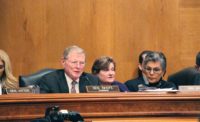An important water-resources measure is starting to move in Congress, with key senators’ introduction of a bill that would authorize $2.4 billion in federal funds to help construct six new Army Corps of Engineers infrastructure projects.
The two-year bill, which Senate Environment and Public Works Committee Chairman John Barrasso (R-Wyo.) introduced on May 8, has bipartisan support and counts the committee’s ranking Democrat, Tom Carper (Del.), among its initial co-sponsors. (View section-by-section summary of bill here. View full bill text here.)
The largest single project by far in the bill, titled the America’s Water Infrastructure Act, is $3.3 billion in storm-protection measures from Sabine Pass to Galveston Bay in Texas. The legislation authorizes a $2.2-billion federal share of the project’s cost.
The bill’s total authorizations are expected to rise in coming months as the Corps completes work on Chief of Engineers’ reports for other projects to add to the list.
Besides the construction authorizations, the measure includes feasibility studies for nine other Corps projects, in 10 states.
Despite the tight election-year schedule, industry officials give the bill favorable odds of being enacted by the end of the year, though it might have to wait until a post-election lame duck session.
John Doyle, special counsel with law and lobbying firm Jones Walker LLP, says, "I think that there is a better than even chance that it will happen before the end of the 115th Congress." That would be in November or December.
Mike Strachn, a senior adviser with water-resources consulting firm Dawson & Associates, says the water measure’s chances of enactment by year's end are “pretty good.” He adds that a lame-duck session “would certainly be a prime time for wrapping up this particular legislation, if it does get wrapped up.”
In the House, Transportation and Infrastructure Committee Chairman Bill Shuster (R-Pa.) has said that water-resources legislation is a priority this Congress. A committee aide says Shuster is llikely to introduce his water-resources bill "very soon," though not before May 14.
Barrasso indicated at a May 9 hearing on the bill that the legislation is a work in progress, with negotiations on other provisions continuing. He said committee leaders plan to attach a package of amendments to the proposal when the panel votes on it later in May.
At the hearing, Sen. John Boozman (R-Ark.) noted that many groups have supported his Securing Required Funding for Water Infrastructure Now (SRF WIN) bill, which is not part of the water-resources bill as introduced. The SRF WIN bill would authorize $200 million a year for water projects financed through state revolving funds and also expedite the project approval process.
Kristina Swallow, American Society of Civil Engineers president, told the committee that the funding gap for water and wastewater infrastructure is estimated at $750 billion over 20 years.
She said Boozman's SRF WIN bill would be "a great tool' to assist local agencies with water infrastructure financing and allow each federal dollar to be supplemented by $50 in other funds.
Swallow also singled out the national dam safety and levee safety programs as particularly important. The Senate committee leaders' bill reauthorizes both programs.
In addition, the proposal has a section dealing with Environmental Protection Agency water programs, including an authorization of $450 million over two years for sewer overflow control grants.
Besides bipartisan support on the Senate committee, the legislation also got a favorable review from a leading environmental group. Madeleine Foote, League of Conservation Voters legislative representative, in a statement called the bill "an important step in the right direction towards fixing our crumbling water infrastructure and ensuring every family has access to clean, safe water."
Strachn points out that the proposal has some “process-related” provisions, dealing with such issues as budgeting, negotiations with local project sponsors and “revisiting” items in the 2014 and 2016 water resources bills that the Senate committee feels haven’t been implemented or require tweaks.
Doyle notes, "My sense is that anything that was controversial, or had the potential of being controversial, was not included in the base bill."
Story updated on 5/9/18 with comments from Senate hearing.





Post a comment to this article
Report Abusive Comment